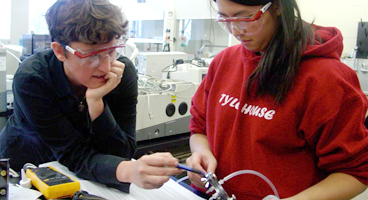Document Type
Conference Proceeding
Publication Date
7-26-2021
Publication Title
2021 ASEE Virtual Annual Conference Content Access
Abstract
This paper describes the completion of a multi-year, multi-institution study to explore students’ transitions from capstone design courses into engineering workplaces. Numerous studies and industry reports point to gaps between school and work with respect to engineering practice. Such misalignment poses a serious challenge to the professional formation of engineers within the academy. Industry-oriented capstone courses are key opportunities to bridge these gaps. These courses provide a direct connect to industry, and faculty view them as vehicles to help students synthesize prior coursework and engage in real-world projects. Yet few if any studies have examined the effectiveness of capstone courses in the context of the transition from school to work. Most research focuses on course structure, pedagogy, assessment, and end-of-course outcomes.
To address this gap, we recruited graduating seniors two years in succession from four different institutions and followed them through their first year of work. Of the 140 participants interviewed prior to graduation, 75 remained in the study for the full year. Data collection included weekly quantitative and qualitative surveys during participants’ first 12 weeks of work, followed by semi-structured interviews after approximately three, six, and twelve months of work. In addition, 15 self-identified women participated in interviews near the end of their second year of work. The study focused on four primary research questions.
RQ1: What skills, practices, and attitudes fostered through the capstone experience do individuals draw on or apply in their early work experiences? RQ2: What differences do individuals identify between their capstone design and early work experiences, and how do those differences help or hinder their school-to-work transition? RQ3: What specific pedagogical practices or aspects of the capstone course do students identify as helping or hindering their transition? RQ4: In what ways do individuals perceive themselves to be underprepared in their early work experiences?
All data from the project have been coded to address the research questions. In this paper, we summarize the answers to these questions, drawing on published journal articles as well as manuscripts in the final stages of development. In short, participants identified significant transfer across four domains: teamwork and communication, self-directed learning, technical engineering work, and engineering identity. Each of these areas posed significant challenges for participants as they entered the workforce, but each also represented areas in which they were able to draw on their capstone experiences to navigate their learning. The industry-orientation of their capstone course played a key role in this transfer. At the same time, participants identified multiple contextual differences between school and work that made the transition more a process of adaptation rather than direct translation of skills and practices. Participants were able to draw on their capstone experiences to develop strategies for navigating their new work contexts.
Rights
© 2021 American Society for Engineering Education.
Recommended Citation
Paretti, M. C., & Ford, J. D., & Howe, S., & Kotys-Schwartz, D. A., & Ott, R. (2021, July), It’s a Context Gap, Not a Competency Gap: Understanding the Transition from Capstone Design to Industry Paper presented at 2021 ASEE Virtual Annual Conference Content Access, Virtual Conference. https://peer.asee.org/37411



Comments
Archived as published.